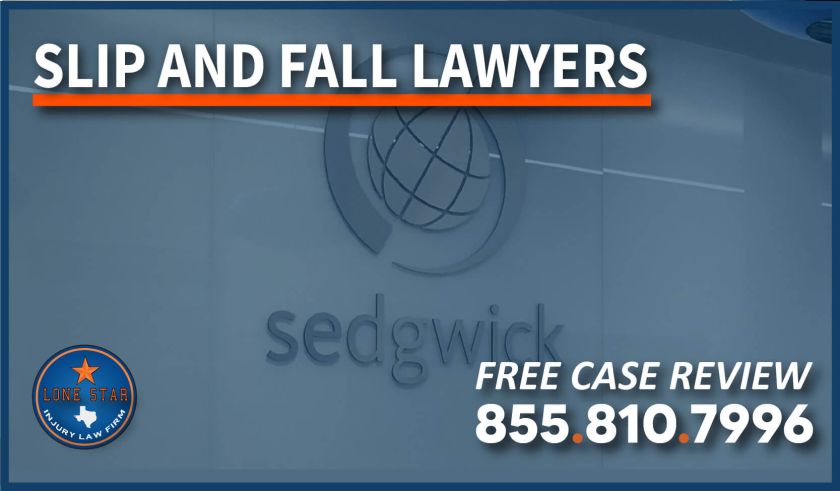Sedgwick Insurance Slip and Fall Lawyers in Texas
Slip and fall accidents, by far, are considered some of the most common types of personal injury accidents, mostly because they can occur practically anywhere (even commercial properties) anytime that a slip hazard is present on the premises.
Were you or a family member involved in a slip and fall accident at a commercial property? Did the slip and fall accident lead to injuries? If so, you could find yourself filing an injury claim against the property owner. If the incident occurred at a commercial property, you might find yourself filing an injury claim against Sedgwick Insurance, which is one of the largest insurance providers for commercial property.
Are you filing an injury claim with Sedgwick Insurance? How is the insurance company handling your claim? Have there been any difficulties with Sedgwick Insurance? All insurance companies – including Sedgwick – unfortunately, will often act in ways to prevent paying out claims even if they are valid. If you believe that the insurance company is purposefully denying your claim, you might be in need of a lawyer.
Are you in need of a Texas injury attorney? If so, do not hesitate to contact the experts at Lone Star Injury Law Firm as soon as possible. Lone Star Injury Law Firm is a personal injury law firm with many years of experience handling all sorts of injury claims, including claims surrounding slip and falls at commercial properties.
Our Texas lawyers are ready to provide you with the representation that you need to pursue your claim against the insurance company. Contact us today.
Understanding Liability for Slip and Fall Accidents at Commercial Properties
Who is liable for the harm resulting from a slip and fall accident at a commercial property? Typically, the property owner is liable for the incident based on the concept of premise liability. Based on premise liability, property owners have a duty to keep their premises completely free of hazards. If they fail to do so, they could be liable for any resulting incidents. This means that affected parties could file a lawsuit against the property owner. These property owners typically have insurance coverage that would cover the costs associated with the incident. However, these insurance companies do not always want to pay.
Is the Insurance Company Refusing Your Claim?
If the insurance company is refusing to pay out your claim, even if it is valid, you might have many questions. Some of the questions that you might be asking yourself could include the following:
- Can I sue the insurance if they unfairly deny my slip and fall injury claim?
- Can I sue Sedgwick Insurance if they refuse to pay for my spine surgery?
- Can I sue Sedgwick Insurance if they refuse to pay for my hip replacement surgery?
- Can I sue Sedgwick Insurance if they refuse to pay for my broken nose?
- Can I sue Sedgwick Insurance if they refuse to pay for my back surgery?
- Can I sue Sedgwick if they refuse to pay for my traumatic brain injury?
- Can I sue Sedgwick if they refuse to pay for my shoulder surgery?
- Can I sue Sedgwick if they refuse to pay for my fractured bones?
- Can I sue Sedgwick if they refuse to pay for my broken ankle?
What is the answer to these questions? The answer is very simple – yes. You could sue Sedgwick Insurance if they refuse to pay for the harm resulting from your accident. For more information about your right to sue the insurance company, do not hesitate to contact the experts at your firm immediately.
Our Recent Verdicts and Settlements
Understanding Insurance Bad Faith
Is the insurance company unfairly denying your injury claim? Is the insurance company giving you the runaround? If so, you might be dealing with insurance bad faith. The denial of an injury or the failure to pay a claim can both be considered bad faith. Because insurance companies have a duty to handle their claims fairly, failing to do so is considered bad faith.
Some additional examples of insurance bad faith include the following:
- Denying that the injury occurred at the property
- Denying the severity of the injury
- Failing to communicate with the claimants (including not responding to emails, calls, or other correspondence)
- Not responding to the claim at all (failing to acknowledge it)
- Not paying medical expenses or refusing to pay the claim entirely
Do any of these apply? If so, the insurance company could be exercising bad faith. In general, insurance companies exercise bad faith in attempts to avoid paying claims – because they lose money every time that they pay a claim. By exercising bad faith, they are essentially trying to get claimants to withdraw their claims or lose their right to file a claim. If the insurance company denies the claim, claimants can typically make an appeal; however, due to a lack of information and a lack of representation, claimants are unlikely to appeal.
If the insurance company is exercising bad faith, you could pursue a claim. You would essentially be pursuing a claim for a breach of contract. You could sue the insurance company to ensure that you ultimately recover the compensation that you are owed.
Can You Be Compensated?
If you file a bad faith claim against the insurance company, you could ultimately be awarded the compensation that you are owed. This could include compensation for any medical expenses, lost earnings, temporary/permanent disability, pain/suffering, property damage, funeral/burial costs, loss of consortium, punitive damages, and legal expenses, for example. If you are interested in learning more about what you could be eligible to recover if your insurance bad faith claim is ultimately successful, do not hesitate to contact the experts at our firm immediately.
Contact Lone Star Injury Law Firm Today
Can I sue for the failure to pay my surgery bills? Can I sue for the failure to pay for my hospital bills? Can I sue for the failure to cover surgery costs, even after they approved the surgery? You could have grounds to sue the insurance company. If you are interested in learning more about your right to sue Sedgwick Insurance for the failure to payout your claim, do not hesitate to contact Lone Star Injury Law Firm Today.
At Lone Star Injury Law Firm, our lawyers are ready to evaluate your claim and provide you with the guidance that you need to win. Our Texas lawyers are not afraid to take on any insurance company to ensure that you recover the payout that you are owed. To make things simple, we offer free legal services, which include free consultations and free second opinions, during which our expert attorneys will answer all your questions and address all your concerns. To benefit from our free legal services and discuss your claim with our experts, contact us immediately.
We also offer a Zero-Fee guarantee, meaning that our clients will not be required to pay any upfront legal fees for our legal services. In addition, our firm is strictly based on contingency; this means that our clients will not pay until they win.
Are you ready to speak with our Texas lawyers? If so, contact Lone Star Injury Law Firm today.


